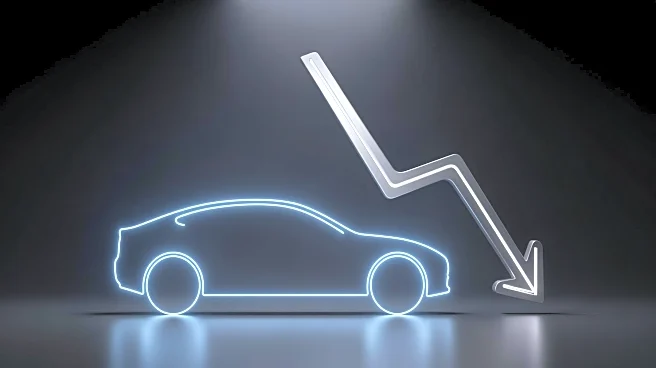What's Happening?
The U.S. electric vehicle market experienced a significant downturn in October 2025, with sales of plug-in vehicles dropping by 26.9% compared to the same month in 2024. According to data from Argonne
National Laboratory, a total of 91,067 plug-in vehicles were sold, comprising 74,897 battery electric vehicles (BEVs) and 16,170 plug-in hybrid electric vehicles (PHEVs). This decline follows a temporary boost in sales during September, attributed to the expiration of the U.S. EV tax credit by Republican lawmakers. Despite the October drop, plug-in electric vehicles (PEVs) captured 7.16% of total light-duty vehicle sales for the month. The cumulative sales of PEVs in the U.S. have reached over 7.6 million units by the end of October 2025.
Why It's Important?
The decline in electric vehicle sales in October highlights the impact of policy changes on consumer behavior and market dynamics. The expiration of the EV tax credit, which had previously incentivized purchases, appears to have led to a significant reduction in sales. This shift could affect the growth trajectory of the electric vehicle industry in the U.S., potentially slowing the transition to cleaner transportation options. Automakers and stakeholders in the EV sector may face challenges in maintaining momentum without the support of tax incentives. The reduction in sales also raises questions about the future of U.S. commitments to reducing carbon emissions and promoting sustainable energy solutions.
What's Next?
As the electric vehicle market adjusts to the new policy landscape, automakers and industry stakeholders may seek alternative strategies to stimulate sales. This could include introducing new models, enhancing vehicle features, or offering competitive pricing to attract consumers. Additionally, there may be increased lobbying efforts to reinstate or modify tax incentives to support the EV market. The industry will likely monitor consumer responses and sales trends closely to adapt to changing conditions. Policymakers may also face pressure to reconsider the impact of tax credit changes on environmental goals and economic growth.
Beyond the Headlines
The decline in EV sales may have broader implications for the U.S. automotive industry and environmental policy. It underscores the importance of government incentives in driving technological adoption and market transformation. The shift away from tax credits could lead to increased competition among automakers to innovate and differentiate their offerings. Furthermore, the reduction in sales may influence public perception of electric vehicles and their viability as a mainstream transportation option. Long-term, this development could affect the pace of infrastructure development for EV charging stations and the overall sustainability of the transportation sector.










